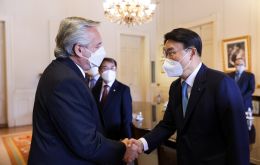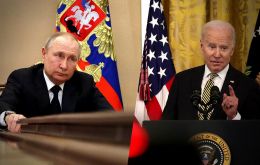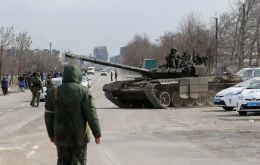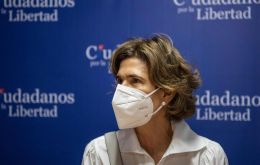MercoPress. South Atlantic News Agency
Politics
-
Tuesday, March 22nd 2022 - 09:51 UTC
Brazilian environmentalists write to EU asking for strict ban of products from deforestation regions

A letter from 34 Brazilian environmental organizations addressed to the European Union called for more effective legislation banning imports from countries involved in deforestation. On Thursday EU ministers are scheduled to meet in Brussels to discuss a proposal banning the purchase of products that fuel deforestation, such as soy, beef, palm oil, cocoa, and coffee.
-
Tuesday, March 22nd 2022 - 09:45 UTC
Argentine President welcomes SK firm's brass ahead of lithium project start

Argentine President Alberto Fernández Monday welcomed a group of executives from South Korean company POSCO (Pohang Iron and Steel Company) who are in the country to build a commercial lithium plant in the province of Salta. POSCO is the world's sixth-largest steel producer.
-
Tuesday, March 22nd 2022 - 09:43 UTC
Boris Johnson promoting energy security with the nuclear industry

British Prime Minister Boris Johnson hosted a roundtable at Downing Street on Monday with leaders from the nuclear industry to discuss how to improve domestic energy security and rapidly accelerate nuclear projects in the UK.
-
Tuesday, March 22nd 2022 - 09:43 UTC
Brazil planning to become a net exporter of wheat, harvesting a volume similar to that of Argentina

Brazil is working to reduce its dependence on foreign produce and hopes to take advantage of recent record exports to increase crops this year. In effect from December 2021 to March 2022, Brazil exported some 2.5 million tons of wheat, an unprecedented volume that benefited from a historically large harvest and, more recently, from additional demand generated by the war between wheat exporters Ukraine and Russia.
-
Tuesday, March 22nd 2022 - 09:38 UTC
Royal Gibraltar Regiment guarding Tower of London, St James Palace, Windsor and Buckingham Palace

The Royal Gibraltar Regiment is conducting Ceremonial Public Duties in London, almost ten years after their second commitment, with their first being in 2002. Following a rigorous inspection of ceremonial uniform and drill sequences which was carried out at Wellington Barracks on Friday, the Royal Gibraltar Regiment proceeded with their First Queen’s Guard which took place at Buckingham Palace on Monday 21 March.
-
Tuesday, March 22nd 2022 - 09:15 UTC
Diplomacy between US, Russia coming to an end

Diplomatic sources in Moscow Monday said whatever remained of ties between Russia and the United States was on the verge of collapse after Washington's Ambassador John Sullivan was handed “a demarche and a note of protest” in view of President Joseph Biden's remarks calling Russian leader Vladimir Putin “a war criminal” amid the invasion of Ukraine.
-
Tuesday, March 22nd 2022 - 09:15 UTC
The Overseas Territories Association denounces Russia's military action against Ukraine

The United Kingdom Overseas Territories Association in a release expressed solidarity with the UK and the international community in denouncing Russia's military action against Ukraine. The statement was released by the President of the Political Council of UKOTA and Premier of the Turks and Caicos Islands, the Hon. C. Washington Misick, on the Overseas Territories’ implementation of the United Kingdom’s sanctions against Russia.
-
Tuesday, March 22nd 2022 - 09:05 UTC
New Zealand halts new Antarctic vessel development due to budgetary crisis

The Government of New Zealand has halted the Antarctic Patrol Ship Project, citing budgetary shortcomings stemming from expenses incurred in the fight against COVID-19, it was reported.
-
Tuesday, March 22nd 2022 - 09:00 UTC
Cristiana Chamorro given 8-year sentence in Nicaragua

Nicaraguan opposition leader Cristiana Chamorro Barrios was sentenced Monday to eight years in prison for “money laundering, property and assets laundering, misappropriation and improper retention, abusive management, and ideological falsehood,” it was reported in Managua.
-
Monday, March 21st 2022 - 18:27 UTC
Corporal punishment of children banned by law in Wales

Effective Monday, Wales has banned all sorts of bodily punishment on children, which are still legal in England and Northern Ireland. Slapping or even shaking a child is tantamount to assault perpetrated against an adult, according to the new rules in force. Until Sunday, slapping was tolerated if it was a “reasonable punishment.”
